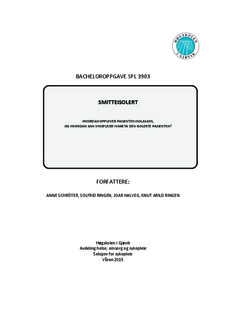| dc.contributor.author | Schröter, Anne | |
| dc.contributor.author | Ringen, Solfrid | |
| dc.contributor.author | Halveg, Joar | |
| dc.contributor.author | Ringen, Knut Arild | |
| dc.date.accessioned | 2015-07-17T11:22:40Z | |
| dc.date.available | 2015-07-17T11:22:40Z | |
| dc.date.issued | 2015 | |
| dc.identifier.uri | http://hdl.handle.net/11250/293324 | |
| dc.description.abstract | NORSK: Innledning:
Isolasjon
er
for
å
forebygge
smitte
mellom
pasienter
og
andre.
Det
er
mange
viktige
faktorer
ved
isolering,
men
det
er
tidligere
studier
som
viser
at
isolasjon
kan
ha
negativ
effekt
for
pasienten.
Hensikt:
Undersøke
hvordan
pasienter
opplever
isolasjon
på
somatisk
avdeling,
og
hvordan
sykepleier
kan
bidra
med
å
forbedre
opplevelsen.
Metode:
Denne
studien
har
benyttet
litteraturstudie
som
metode,
og
er
basert
på
5
kvantitative
og
2
kvantitative
og
kvalitative
forskningsartikler,
samt
annen
relevant
litteratur.
Resultat:
Litteraturstudien
viser
at
opplevelsen
av
isolasjon
ikke
nødvendigvis
bare
er
negativ,
men
for
å
forebygge
negative
effekter
av
isolasjon
trenger
pasienter
informasjon,
trygghet
og
ivaretagelse.
Kontakt
med
sykepleier
og
besøkstiden
var
redusert,
mangelfull
dokumentasjon,
kommunikasjon
og
økt
fare
for
komplikasjoner.
Sosiodemografiske
variabler
kan
påvirke
opplevelsen
av
isolasjon.
Konklusjon:
Opplevelsen
av
isolasjon
er
individuell,
og
har
både
positive
og
negative
sider.
Sykepleier
må
ha
kunnskap
og
kompetanse
om
opplevelsen
og
konsekvenser
av
isolasjon.
Autonomi,
kommunikasjon,
informasjon
og
opplæring
er
viktige
faktorer
for
å
forbedre
isolasjon. | nb_NO |
| dc.description.abstract | ENGLISH: Introduction:
The
isolation
of
patients
within
the
medical
setting
is
to
prevent
the
transmission
of
infection
between
patients
and
others.
There
are
many
important
factors
when
a
patient
is
placed
under
isolation
precautions,
but
there
are
studies
which
present
results
that
isolation
may
also
have
negative
effects
for
the
patient.
Aim:
Examine
the
effect
of
isolation
precautions
on
patients
in
the
healthcare
setting
and
how
nurses
can
contribute
to
improving
the
patient
experience.
Method:
This
study
drew
from
literature
based
method
and
is
based
on
five
quantitative
and
two
qualitative
and
quantitative
research
articles,
as
well
as
other
relevant
literature.
Result:
The
literature
study
shows
that
patient
experience
while
under
isolation
precautions
is
not
necessarily
negative,
but
in
order
to
prevent
further
negative
effects
of
isolation,
patients
will
need
information,
security,
and
observation.
Contact
with
the
attending
nurse
and
visiting
hours
were
reduced,
insufficient
documentation,
communication
and
increased
risk
of
complications.
Socio-‐demographic
variables
can
also
affect
the
experience
while
in
isolation.
Conclusion:
The
experience
of
isolation
is
dependent
upon
the
individual
and
has
both
positive
and
negative
effects.
Nurses
must
have
the
knowledge
and
expertise
of
the
experience
and
consequences
of
isolation.
Autonomy,
communication,
information
and
training
are
key
factors
in
improving
the
patient´s
experience
while
placed
under
isolation
precautions. | nb_NO |
| dc.language.iso | nob | nb_NO |
| dc.subject | isolasjons | nb_NO |
| dc.subject | smitte | nb_NO |
| dc.subject | sykepleie | nb_NO |
| dc.title | Smitteisolert: hvordan opplever pasienten isolasjon, og hvordan kan sykepleier ivareta den isolerte pasienten? | nb_NO |
| dc.title.alternative | Source isolation: how do patients experience isolation, and how can nurses take care of these patients? | nb_NO |
| dc.type | Bachelor thesis | nb_NO |
| dc.subject.nsi | VDP::Medical disciplines: 700::Health sciences: 800::Nursing science: 808 | nb_NO |
| dc.source.pagenumber | 51 | nb_NO |
